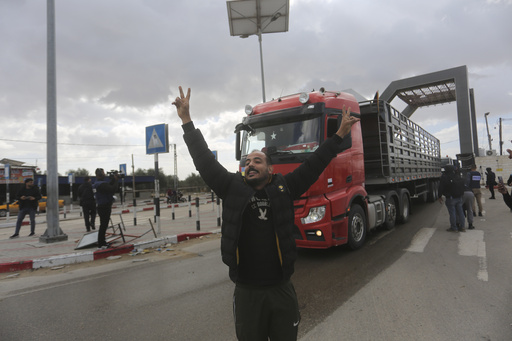Humanitarians want more aid for Gaza, access to hostages under Israel-Hamas truce

A Jordanian humanitarian aid convoy enters the Gaza Strip from Egypt in Rafah on Monday, Nov. 20, 2023. AP
GENEVA — International aid groups say they are ready to deliver thousands of truckloads of food, water and other supplies to besieged Gaza if a temporary ceasefire in the Israel-Hamas war takes hold.
Some hailed an important first step, but many said Wednesday that a four-day truce isn’t enough to meet overwhelming needs after seven weeks of fighting have displaced hundreds of thousands of Palestinians now living in miserable conditions.
Key details of the accord announced Wednesday remain unclear, including the mechanics of getting more aid to desperate civilians and escorting the first group of Israeli hostages out of Gaza where they have been held since Hamas’ Oct. 7 rampage in Israel.
The cease-fire efforts hit a hurdle Wednesday when Israel’s national security adviser Tzachi Hanegbi said in a late-night announcement that the deal would not take effect before Friday, a day later than originally expected.
Aid groups say a key ambition is to get help to northern Gaza, which has been largely inaccessible and where nearly all hospitals stopped working during a blistering air and ground offensive by Israeli forces.
Article continues after this advertisement“The entire humanitarian sector is ready to scale up once everything is set,” said Tommaso Della Longa, a spokesman for the International Federation of Red Cross and Red Crescent Societies, an umbrella organization that amounts to the world’s largest humanitarian aid group.
Article continues after this advertisementThe international community and aid groups have been trying to find ways to get aid into Gaza since Israel retaliated for Hamas’ slaying of some 1,200 people in Israel on Oct. 7. The onslaught has killed at least 11,000 people in Gaza, health officials in the Hamas-controlled enclave say.
Della Longa lamented bottlenecks he said have confounded the delivery of already insufficient aid into Gaza. He said his umbrella group hoped a truce deal would include a faster track of aid shipments.
The only route for international humanitarian aid into Gaza since the start of the war has been through the Rafah crossing between Egypt and Gaza. Planeloads of supplies have been flown into the nearby Egyptian city of El-Arish, and trucks have queued up near Gaza.
Intense Israeli inspections of Gaza-bound trucks and cargo have slowed their entry.
Joel Weiler, executive director of Doctors of the World, a Paris-based relief organization, said a four-day window was far too short.
“Even if the aid enters, it will take three [to] four days to deliver to doctors to get it, and then the fighting starts again,” he said. “It’s a joke. It’s white-washing.”
Many humanitarians say shipments through Rafah amount to only a trickle compared to the total needs of Gaza’s 2.3 million people, and want the restoration of access through the Kerem Shalom crossing — the main entry point for commercial goods into Gaza from Israel. It has been shuttered since the conflict began.
“If Kerem Shalom doesn’t open, the logistical nightmare will continue forever,” said Jan Egeland, head of the Norwegian Refugee Council, an aid group with 53 workers in Gaza.
Spokesperson Shani Sasson of COGAT, the Israeli military body responsible for Palestinian affairs, said she was “not aware of any changes” at Israel’s Nitzana crossing with Egypt to accommodate greater aid deliveries during a truce. Nitzana is where Israeli authorities check aid trucks before they enter Gaza at Rafah.
Della Longa, of the Red Cross and Red Crescent, said freedom of movement for humanitarians is another concern.
“It’s not enough to open up a gate. After opening a gate, you need to create a safe humanitarian space where we can work,” he said.
One upside is that during the four-day pause in fighting, aid groups could reach “different people, different communities and different hospitals that were not reachable before,” like in the north, Della Longa added.
Another important concern is fuel, which is in short supply. Israel has prevented virtually all fuel from getting in, except for a few small deliveries to the main U.N. agency on the ground, for fear Hamas could use it. Some aid groups say they couldn’t get enough fuel into Gaza over the four days to distribute aid to the hard-to-reach north.
“We are very restricted in who we can reach,” said Jason Lee, director for Save the Children in the Palestinian territories. “This is why we need a full cease-fire and the resumption of food, fuel and people through all available crossings.”
“Otherwise, we are just Band-Aids,” he added. “And very ineffective Band-Aids.”
Uncertainty is also looming over possible arrangements for contacting Israeli hostages in Gaza.
During the coming four days, 50 hostages, all women and children, are to be released by Hamas in stages, in exchange for some 150 Palestinian prisoners held by Israel.
Hamas is believed to be holding about 240 Israelis seized during the Oct. 7 raid. Israel holds close to 7,000 Palestinians on various security offenses, including about 1,800 detained since the start of the war.
The International Committee of the Red Cross has previously escorted hostages out of Gaza. In all, four were released since the start of the war.
Red Cross officials said they had not been notified of any agreement between the sides to enable visits with hostages during the truce.
“Should a visit be agreed upon, the ICRC stands ready to visit,” said the Geneva-based organization, which focuses on conflict and the rights of detainees but does not engage in negotiations over releases.
Its president, Mirjana Spoljaric on Monday met with Hamas’ supreme leader Ismail Haniyeh in Qatar’s capital. Qatar led weeks of indirect negotiations over a truce-for-hostages deal involving the United States and Egypt.